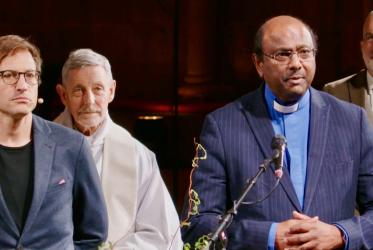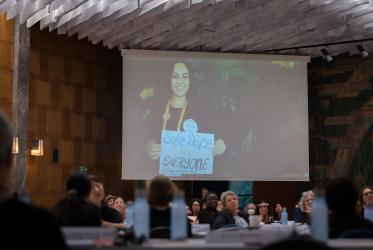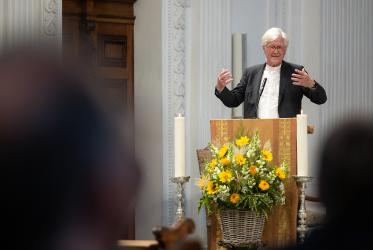The World Council of Churches (WCC) is facing growing expectations from member churches as well as ecumenical partners and international organizations. These high expectations must be met in a situation of more limited financial resources. This is a result of the changed exchange rates of many other currencies against the Swiss franc, in which the WCC pays its local expenses. With the franc strengthening throughout 2015, there is an urgent need to reduce all costs, including staff costs. This has led to some reductions in the staff, and it also leads to review of the ways of working in the organization. WCC News met with the general secretary Rev. Dr Olav Fykse Tveit, to let him explain the major challenges the council is facing at the moment.
The WCC staff received information that the WCC will reduce the number of its staff members in Switzerland by eight people due to economic and restructuring reasons.
Olav Fykse Tveit explains: “The decisions shared now come after consultation within the staff leadership group (SLG) at the request made of the Executive Committee in its June 2015 meeting.”
What is the reason behind these decisions?
Tveit: “We are called to carry out the WCC’s core mission in this current financial reality. The decisions we have made are budgetary. Yet our strategic plan calls us to greater collaboration within the fellowship and likewise within the staff community as we strengthen planning, coordination, communication and administration within the Council.”
Tveit continued: “These two realities point to the affirmation on one hand that the WCC remains as relevant as in the past and has much work still to do, and on the other hand the need of the WCC to reduce its staff structure to a size that is sustainable, given the current resources available, yet nimble and optimally efficient. We are thankful that we do have resources at our disposal. While they may not be at the same levels as in the past, they are far from being insignificant, so we are called to work within the resources that we have.”
Tveit added that many are resonating with the unifying motif of the Pilgrimage of Justice and Peace, finding entry points and places of synergy.
How did you prioritize the reductions?
Tveit: “We have striven to avoid severe staff reductions, while seeking the needed balance between implementation costs and staffing costs.”
Why now?
Tveit: “As early as January, after the Swiss National Bank made its announcement regarding the exchange rate of the Swiss franc (CHF), we have been carefully monitoring the Council’s financial situation and all along the way informing the staff representative group of the situation. In April we also shared with staff the financial realities for 2015, inviting suggestions for cost saving measures. Thanks to all the good efforts of the staff we were able to reduce costs for 2015 without requiring staff reductions, to this point.“
What kinds of measures have been taken in 2015 for budget 2015?
Tveit: “For budget 2015, several staff vacancies were frozen, and, amongst other measures, efforts were made to reduce expenditure on implementation costs.”
What kinds of estimated reductions in expenditure are required for 2016?
Tveit: “A budget for 2016 is yet to be finalized. Because of the already deep reductions in implementation costs, it is impossible to meet this target without concomitant reductions in staff costs.
Tveit added: “During this year and next, there will be several departures due to retirement and already known ends of contracts. Some of these positions will not be refilled, resulting in some of these responsibilities being taken up by other colleagues in other ways. This is already calculated in the budget work for 2016. These positions are at every level of the Council — leadership, programme executives and other parts of the staff community. Due to the Council’s priorities, in few cases, there will be some positions, particularly at the programme executive level, with revised profiles that will be filled to ensure the WCC’s capacities.”
What’s your message to the member churches and ecumenical partners?
Tveit: “We are committed to the strategic plan for 2014-17, using the resources available. We focus on the sustainability of the Council and are encouraged by strong commitments from our partners to work with us. We prioritize our tasks within the framework we have.”
What’s the main focus for the WCC?
Tveit: “As we continue on the Pilgrimage of Justice and Peace, momentum is building. We now try to move forward in a focused, strategic and collaborative way. Over the last months, many of the measures taken and tools implemented have been for the purpose of greater and more efficient collaboration with churches and partners as well as within the staff community and across programme areas.”
Tveit added: “We are blessed to have staff colleagues who are dedicated and extremely capable; however, we have come to the point where we can no longer afford to maintain the level of staffing that we have had in recent years without risking levels of reductions in implementation that would prove to be inadequate and counterproductive.”
Tveit concluded: “Certainly, at moments such as this, it is helpful to seek comfort, assurance and guidance from the God of life who is the source of strength and provision, as we try to support those who lose their jobs in the WCC.”
By Marianne Ejdersten, director of Communications at the WCC.
For more information and interview requests, please contact:
Georges Lemopoulos, deputy general secretary, World Council of Churches
E-mail: [email protected]. Phone: +41 22 791 62 88
Marianne Ejdersten, communication director, World Council of Churches.
E-mail: [email protected]. Phone: +41 79 507 6363 or +41 22 791 6704





